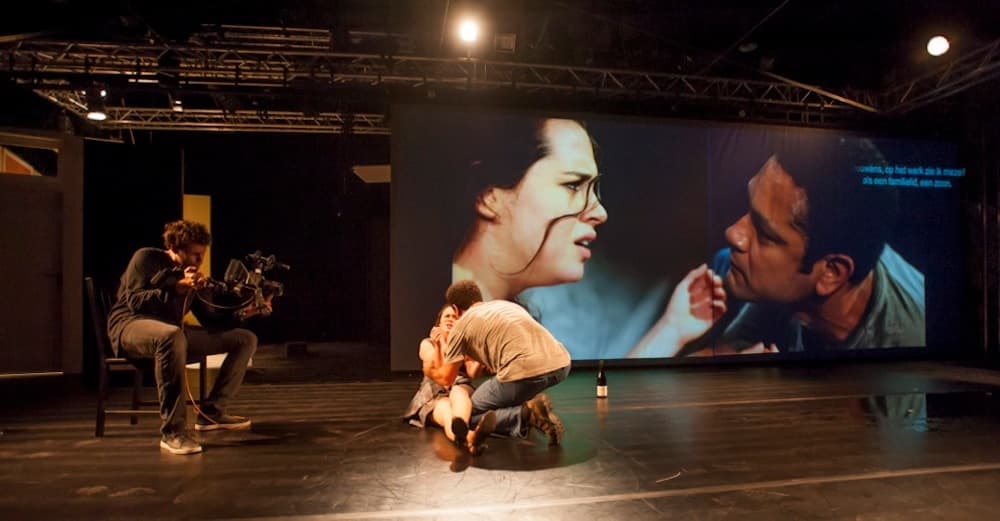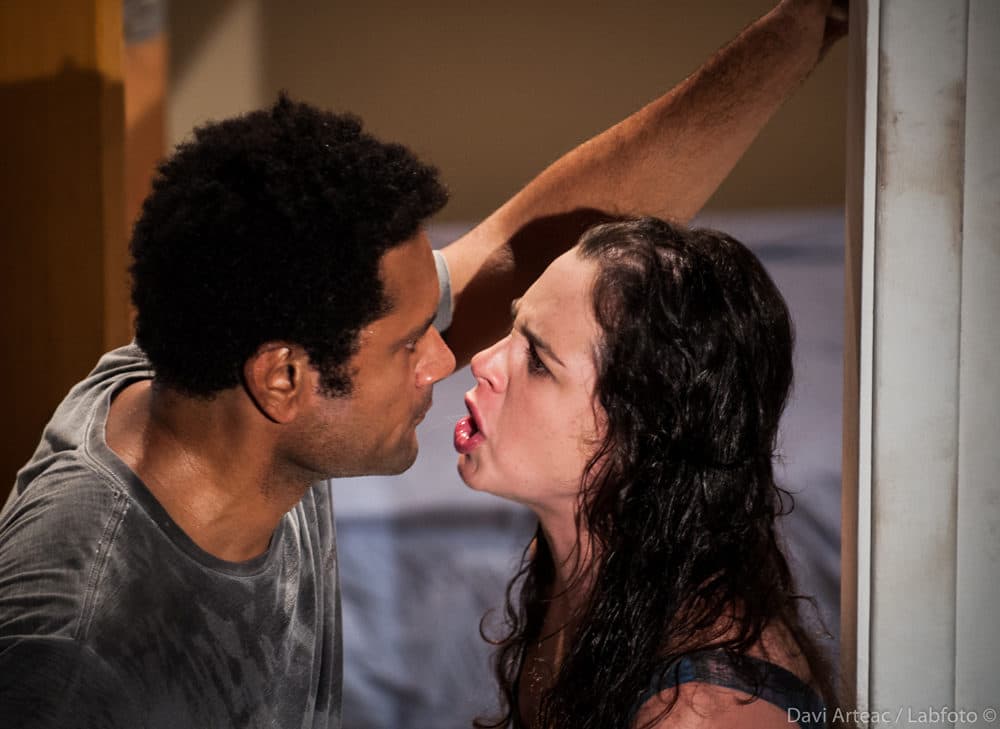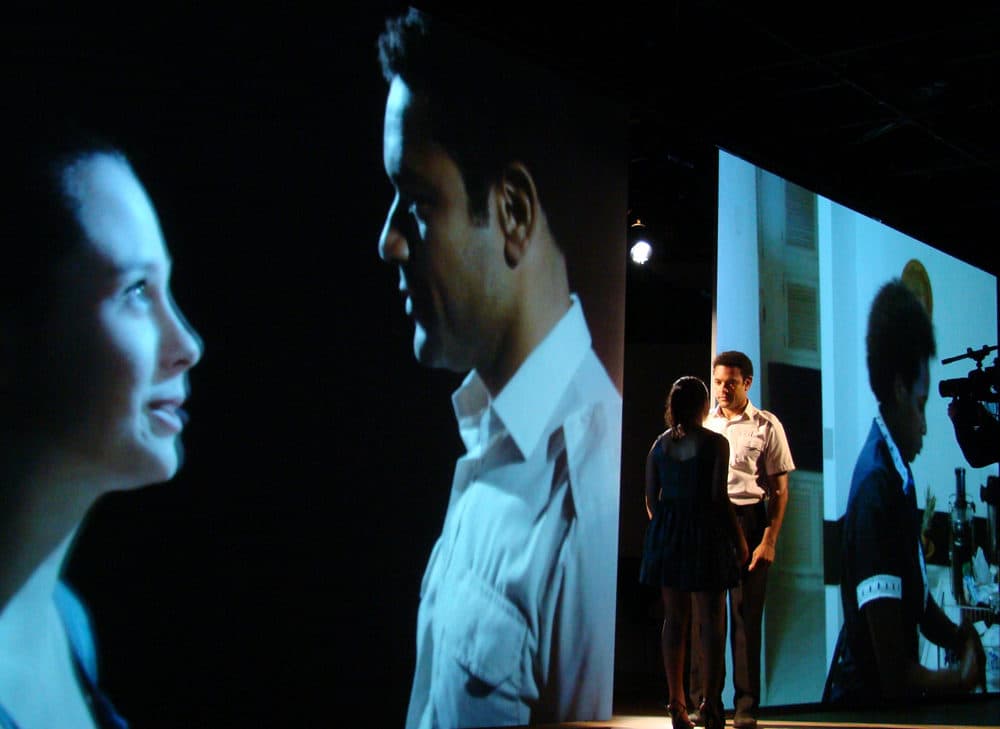Advertisement
Review
'Julia' Makes 'Miss Julie' Tryst In Bold New Directions At ArtsEmerson

Affairs are passionate, messy things that thrive in curated realities revealed during the time devoted to them. Stolen kisses, late-night conversations, and faux promises of a future together feed desire and hope. Often, these sunny-at-first trysts can’t withstand the crush of everyday life.
Such is the case in Christiane Jatahy’s "Julia," a modern take on August Strindberg’s “Miss Julie.” In this vigorous, often-adapted play within a film, the bright blush of a forbidden relationship seeps into a party on a summer night and viscously explodes by morning. Although the narrative sticks pretty close to Strindberg’s, Jatahy (“Ithaca,” “The Walking Forest”) exchanges the Swedish countryside for Brazil, a 25-year-old Julia for an underage one, and she amps up the complication of class with race.
This isn’t the first-time race gets factored into an adaptation of this classic tale. ArtsEmerson presented Yaël Farber’s award-winning South African version, "Mies Julie," in 2013. The ArtsEmerson Boston premiere of Jatahy’s “Julia” is available for streaming Feb. 9 – 22.

Actors Julia Bernat (Julia) and Rodrigo de Odé (Jelson) render a superb portrayal of rich girl and servant. At the party, Jelson’s desire for the boss’s daughter is blatant as he watches her dance while standing just outside the shot.
Their flirting is obvious and unseemly, but there’s a fascination Julia has with being the center of his orbit and the person over whom she can exert control. I wince whenever Julia demands anything, even playfully, because no matter the directive, Jelson must do it. She makes him kiss her foot, and it’s hard to tell if he wants to do it because he wants to be with her or because he has to do it. Either way, he relents.
The Brazilian-born Jatahy digs deeper into race and class when the cook, Cristina (Tatiana Tiburcio), learns about the affair. She wants to move because she can’t live in a place where she doesn’t respect the boss. For Jelson, Julia’s recklessness proves that “they’re not better than us.” Cristina thinks differently. “If they’re not better than us, then there’s no justification for what we are.” Her thinking brings to mind Pulitzer-prize winning author Isabel Wilkerson’s "Caste." In an interview, Wilkerson says, "Caste focuses in on the infrastructure of our divisions and the rankings, whereas race is the metric that's used to determine one's place in that."
Advertisement
Julia doesn’t heed Jelson’s warnings about how dangerous their fling is and doesn’t give a second thought to the ways this could impact his life or hers until later. After a moment of intimacy, she tells him to sit down over and over while he demurs. Finally, she unleashes a vile tongue-lashing on him that he serves right back to her in a rage that stuns. And so goes their tumultuous night together — a popping and fizzing of lust, power, pain, hate, and sometimes, maybe love.
Using multiple mediums, Jatahy fastidiously meshes theater and cinema in “Julia.” It’s taped before a live audience with video projection on split screens that move during the show. Behind them are partial sets, all of which provide different perspectives. Some scenes are shot through the gaps of panels and projected while a roving cameraman captures bits that might otherwise be missed.
The cameraman, who could be distracting, ends up offering another level of access at specific points and comic relief — such as asking for a shoe to be thrown again — at others. Perhaps since theatergoers are used to a bit of process peeking through with stagehands scurrying onstage to move or take away furniture or props, the videographer quickly becomes part of the story. He even gets to say a few lines in addition to saying action or cut.
Jatahy’s award-winning work lives at these intersections and typically feature integration of forms. Her work is in “dialogue with different artistic areas,” she writes on her website. Many of her plays “question the boundaries of reality and fiction, actor and character, theater and cinema.” Currently, Jatahy is the associate artist of the Odeon Theatre de l'Europe, CentQuatre-Paris, the Theatre National Wallonie-Bruxelles and Schauspielhaus Zürich.
Throughout the performance, the audience only gets to see so much in certain scenes: a corner of a room, the silhouette of a body. These slivers are like secret liaisons; one never sees the full picture or the entire person. The same is true for the two lovers.
Watching the show feels a little like sensory overload in the best way. Droves of crickets or grasshoppers roar on the night of the party, pulling audiences into the garden. Shadow and light seem to nod at Julia and Jelson’s dichotomous relationship, and the music’s timbre rises and falls with the twists and turns of the actors’ myriad moods once they cross a line. In Strindberg’s version, the intimacy is behind closed doors. In Jatahy’s, there’s a fierce unleashing the audience sees and hears. It’s urgent, needy and intense even onscreen. The scene and the post-coitus eruption of the character’s relationship, as a result, sparks a visceral reaction that would likely be even more acute in person.

Once they’re out of bounds, Strindberg’s misogyny leaks out in the cavalier way Jelson quickly composes himself and in the ensuing dialogue. Julia’s face appears blurry onscreen as she slumps against the yellow wall in Jelson’s room. For the first time, she appears uncertain. The tenderness Jelson showed her when drying the pool’s water from her skin or planting soft kisses on her back are quickly forgotten. The thought of danger is suddenly very real as they contemplate what will happen as Julia’s dad returns home from a trip.
Maybe they’ll leave hand in hand. For a moment, Bernat breaks the fourth wall to talk about Strindberg’s ending and his problematic view of relationships. She urges us to move beyond that.
But the two can’t get it together. They spend more time trading barbs, and soon, family secrets tumble out, and constructed fantasies shatter as the darkness inside them spills onstage. After the gut-wrenching back and forth with the characters spent, the play tapers off softly as the weight of all their utterances hangs in the air.
ArtsEmerson’s “Julia” is available for streaming Feb. 9 – 22.
